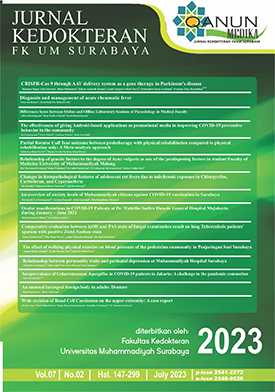The effectiveness of giving Android-based applications as promotional media in improving COVID-19 preventive behavior in the community
Abstract
Public understanding of COVID-19 is the main focus to break the chain of spread. The massive spread of the virus shows the lack of public knowledge about preventing transmission. The best way to prevent and slow down transmission is to get information about COVID-19. There are still limited promotional media in providing health education in the community, especially Android-based applications. The purpose of this study was to determine the effect of giving an Android-based application as a promotional medium in improving COVID-19 prevention behavior in the community. This study used a pre-experimental research design with one group pre-test and post-test design. The population is all people in the Mulyorejo village amounted to 22.862 and taken samples of 193 people using a non-probability purposive sampling technique with the respondent criteria aged 31-45 years. The knowledge questionnaire consisted of 20 statements and the attitude questionnaire with 18 statements. The statistical test uses the Wilcoxon Signed Rank Test to find out differences in knowledge and uses the Chi-Square Test to find out differences in attitudes. The results of knowledge have increased from pre-test sufficient knowledge (52.8%) and post-test good knowledge (80.3%) using the Wilcoxon signed rank test p=0.000<0.05. The results of attitudes have increased from pre-test negative attitudes (63.2%) and post-test positive attitudes (76.2%) using the Chi-square test p=0.000<0.05. The conclusion is that there is an effect of giving Android-based applications as a promotional medium in improving COVID-19 prevention behavior in the community.
Full text article
References
Alrasheedy, A. A., Abdulsalim, S., Farooqui, M., Alsahali, S., & Godman, B. (2021). Knowledge, attitude and practice about coronavirus disease (Covid-19) pandemic and its psychological impact on students and their studies: A cross-sectional study among pharmacy students in Saudi Arabia. Risk Management and Healthcare Policy, 14, 729–741. https://doi.org/10.2147/RMHP.S292354
Bedford, J., Enria, D., Giesecke, J., Heymann, D. L., Ihekweazu, C., Kobinger, G., Lane, H. C., Memish, Z., Oh, M. don, Sall, A. A., Schuchat, A., Ungchusak, K., & Wieler, L. H. (2020). COVID-19: towards controlling of a pandemic. The Lancet, 395(10229), 1015–1018. https://doi.org/10.1016/S0140-6736(20)30673-5
Djalante, R., Lassa, J., Setiamarga, D., Sudjatma, A., Indrawan, M., Haryanto, B., Mahfud, C., Sinapoy, M. S., Djalante, S., Rafliana, I., Gunawan, L. A., Surtiari, G. A. K., & Warsilah, H. (2020). Review and analysis of current responses to COVID-19 in Indonesia: Period of January to March 2020. Progress in Disaster Science, 6(March), 100091. https://doi.org/10.1016/j.pdisas.2020.100091
Eaton, L. A., & Kalichman, S. C. (2020). Social and behavioral health responses to COVID-19: lessons learned from four decades of an HIV pandemic. Journal of Behavioral Medicine, 43(3), 341–345. https://doi.org/10.1007/s10865-020-00157-y
Faezipour, M., & Abuzneid, A. (2020). Smartphone-Based Self-Testing of COVID-19 Using Breathing Sounds. Telemedicine and E-Health, 00(00), 1–4. https://doi.org/10.1089/tmj.2020.0114
Gray, D. J., Kurscheid, J., Mationg, M. L., Williams, G. M., Gordon, C., Kelly, M., Wangdi, K., & McManus, D. P. (2020). Health-education to prevent COVID-19 in schoolchildren: a call to action. Infectious Diseases of Poverty, 9(1), 81. https://doi.org/10.1186/s40249-020-00695-2
Iyengar, K., Upadhyaya, G. K., Vaishya, R., & Jain, V. (2020). COVID-19 and applications of smartphone technology in the current pandemic. Diabetes and Metabolic Syndrome: Clinical Research and Reviews, 14(5), 733–737. https://doi.org/10.1016/j.dsx.2020.05.033
Jaga, K., Penularan, P., & Indonesia, C.-. (2020). ORIGINAL ARTICLE COMMUNITY KNOWLEDGE , ATTITUDES , AND BEHAVIOR TOWARDS SOCIAL DISTANCING POLICY AS PREVENTION TRANSMISSION OF COVID-19 IN INDONESIA. 8(1). https://doi.org/10.20473/jaki.v8i2.2020.4-14
Lee, M., Kang, B. A., & You, M. (2021). Knowledge, attitudes, and practices (KAP) toward COVID-19: a cross-sectional study in South Korea. BMC Public Health, 21(1), 1–10. https://doi.org/10.1186/s12889-021-10285-y
Li, X., Geng, M., Peng, Y., Meng, L., & Lu, S. (2020). Molecular immune pathogenesis and diagnosis of COVID-19. Journal of Pharmaceutical Analysis, 10(2), 102–108. https://doi.org/10.1016/j.jpha.2020.03.001
Lotfi, M., Hamblin, M. R., & Rezaei, N. (2020). COVID-19: Transmission, prevention, and potential therapeutic opportunities. Clinica Chimica Acta, 508(April), 254–266. https://doi.org/10.1016/j.cca.2020.05.044
Ming, L. C., Untong, N., Aliudin, N. A., Osili, N., Kifli, N., Tan, C. S., Goh, K. W., Ng, P. W., Al-Worafi, Y. M., Lee, K. S., & Goh, H. P. (2020). Mobile health apps on COVID-19 launched in the early days of the pandemic: Content analysis and review. JMIR MHealth and UHealth, 8(9), 1–17. https://doi.org/10.2196/19796
Prompetchara, E., Ketloy, C., & Palaga, T. (2020). Immune responses in COVID-19 and potential vaccines: Lessons learned from SARS and MERS epidemic. Asian Pacific Journal of Allergy and Immunology, 38(1), 1–9. https://doi.org/10.12932/AP-200220-0772
Timmers, T., Janssen, L., Stohr, J., Murk, J. L., & Berrevoets, M. A. H. (2020). Using eHealth to support COVID-19 education, self-assessment, and symptom monitoring in the Netherlands: Observational study. JMIR MHealth and UHealth, 8(6). https://doi.org/10.2196/19822
Notoatmodjo, Soekidjo. (2014). Promosi Kesehatan dan Perilaku Kesehatan. Jakarta. Rineka Cipta.
Nursalam. (2017). Metodologi Penelitian Ilmu Keperawatan: Pendekatan Praktis. Jakarta: Salemba Medika.
Azwar, Saifuddin. (2015). Sikap Manusia: Teori & Pengukurannya. Yogyakarta: Pustaka Pelajar.
Authors
Copyright (c) 2023 Ira Purnamasari

This work is licensed under a Creative Commons Attribution 4.0 International License.

Qanun Medika by FK UM Surabaya is liscence under Lisensi Creative Commons Atribusi 4.0 Internasional.

